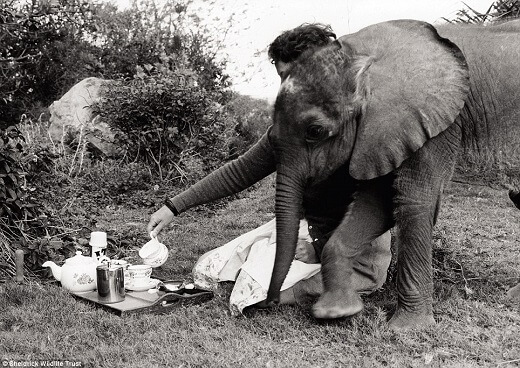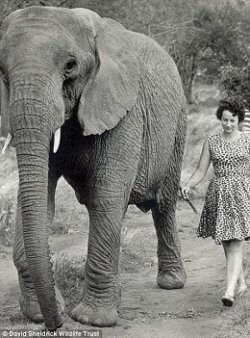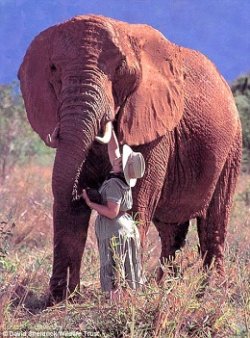Daphne Sheldrick, who died this week at age 83, is being celebrated and remembered all over the world for her remarkable work with elephants in Africa.
Daphne was the founder of the David Sheldrick Wildlife Trust, whose Elephant Orphanage has raised hundreds of infants of mothers who had been murdered for their ivory tusks. (The trust was named in memory of her husband, David, the renowned naturalist and founding warden of Tsavo East National Park in Kenya.)
She once told author Charles Siebert:
“Elephants are very human animals. Their emotions are exactly the same as ours. They’ve lost their families, have seen their mothers slaughtered, and they come here filled with aggression — devastated, broken and grieving.”
And so, she became their adoptive mother until they were ready to graduate from the orphanage and join an existing family in the wild. Sometimes, many years later, when they gave birth to a calf of their own, they would bring the baby back for a visit and introduce her to Daphne and her team of caregivers. Truly she filled the role of matriarch of all the elephants who had come to the sanctuary as calves. They would never forget her.
Daphne’s work reached way beyond the sanctuary itself. For example, she was well-known for saving habitats, creating conservation programs, and touching wildlife of all kinds all over Africa.

Afternoon tea, Kenya-style. Daphne Sheldrick with orphan Aisha in 1974.
Not talked about so much, however, but just as valuable, was the gold standard she set for the sanctuary movement all over the world. When she established the Trust in 1977, there were very few wildlife sanctuaries anywhere. It would be years before the first elephant sanctuary was created in the United States. And for any of us who would be setting up sanctuaries for chimpanzees, wild cats, homeless pets and so many more, Daphne’s work was the model.
From her first major success in developing a formula to replace elephant mothers’ milk (it took 25 years of trial and error and the critical ingredient was coconut oil!), to building teams of human “families” at the sanctuary to fill the role of the extended family that infants depend on in the wild, to helping them return to the wild, she did it all.
And it all grew out of her uniquely hands-on relationship to the animals themselves: splashing with them barefoot through the dirt during the day, and comforting newborns at night when they cried out in their sleep, apparently suffering nightmares.


Daphne with orphan baby Eleanor in 1968 ….. and dwarfed by her 23 years later in 1989.
For all that Daphne Sheldrick did – and that the Trust will continue to do in the hands of her daughter, Angela – she knew she was fighting an uphill battle. Over the years the elephant population has continued to dwindle to the point where the entire species is now staring into the face of extinction. But rather than this dampening her spirit, it only spurred her to greater efforts. And everything she did was rooted in the simple yet fundamental understanding that the priority was always the elephants in her care.
At the end of her memoir, Love, Life, and Elephants: An African Love Story, in the Acknowledgments section, she expressed her own special thanks to:
“… the elephants themselves, who by example have demonstrated how to cope with adversity …They, who have suffered so much at the hands of humans, never lose the ability to forgive, even though, being elephants, they will never be able to forget.”
All of us who are in the work of creating and sustaining sanctuaries know that we, like Daphne, are guided by the animals and follow their lead. We know that any authentic sanctuary is not just a place to live but a place to thrive. And we understand that the wellbeing of the animals in our care is always the highest – indeed the only – priority.
In a beautiful interview with Bob Simon on CBS’s 60 Minutes (see below), she said of the elephants:
“Their tremendous capacity for caring is, I think, perhaps the most amazing thing about them. They have all of the best attributes of us humans and not very many of the bad.”
Here at the Whale Sanctuary Project, we could say the same of the whales. They have much in common with their pachyderm cousins: amazing intelligence, close family ties, and, of course, the way they continue to be abused and exploited for the basest of human appetites.
So, thank you, Daphne. As the matriarch of sanctuaries, you will continue to be an inspiration to so many of us in modeling the values and techniques that have shaped our movement over the last half century.
Videos of the elephant orphanage:
The “60 Minutes” feature with Bob Simon
Africa’s Elephant Mother: Broadcast: 21 August, 2011 on Sunday Night, Seven Network, Australia.
Daphne Sheldrick’s Elephant Orphanage in Kenya by Michael Fairchild
1 Comment
My Hero…